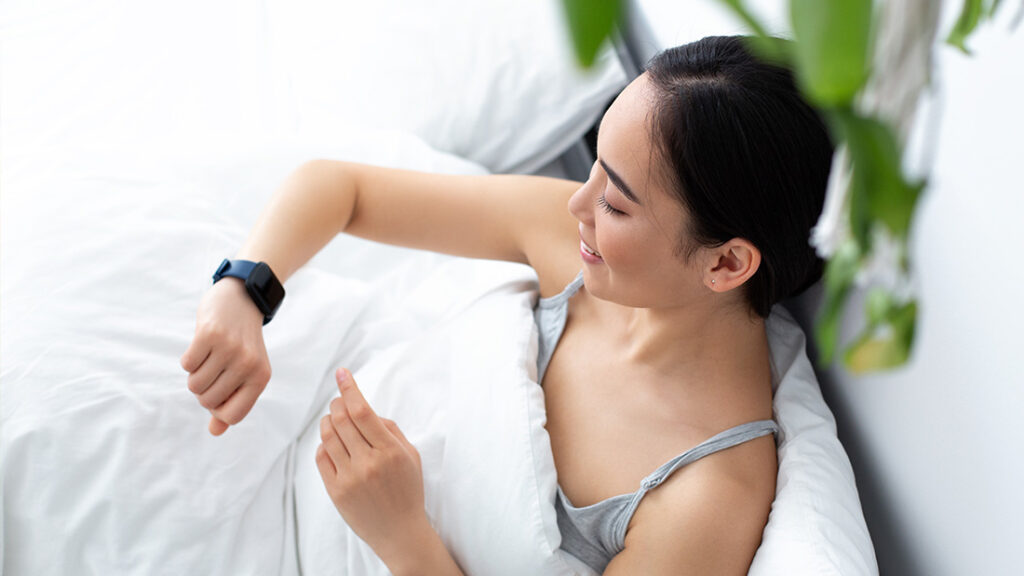
From the Oura Ring to the Fitbit Sleep Tracker, devices like these help people get their sleep health on track. Just like an Apple Watch reminds you to get your recommended 10,000 steps a day, sleep devices help people not just to prioritize an early bedtime but also to engage in daily activities that actively foster improved sleep quality.
Sleep trackers act as helpful prompts, serving as gentle nudges for individuals to steer clear of alcohol before bedtime and encouraging daytime activity to guarantee a rejuvenating night’s sleep.
While some of us may lean on these wearable devices, it’s essential to recognize that, ultimately, they are limited machines. Advice from experts reminds us that the information provided may not always be as precise as we might assume.
So before we go into what these wearable devices can and cannot do, it’s important to learn a bit more about how they work.
In a recent New York Times article, Dr. Cathy Goldstein, a professor of neurology at the University of Michigan, who also studies the use of sleep monitors, provided some insight on how these tiny devices can put in a lot of work to make sure our health is in check. (1)
She told the New York Times that in order for these devices to collect our data, they use a technology known as photoplethysmography or, more simply put, PPG.
“There’s this little light on the back of the device that shines into the blood vessels, and it uses the amount of light that is reflected back to estimate things like heart rate and heart rate variability,” she said in the Times article.
She said that non-wearable monitors that you place on your bed or next to you, use a technology called ballistocardiography, which detects your movement throughout different sleep stages.
Despite the sophistication of this technology, it’s crucial to understand its limitations. While advanced, it doesn’t delve as deeply into the intricacies of our sleep patterns as you might assume. Instead, it primarily focuses on capturing only the surface of our sleep health, specifically distinguishing between periods of being asleep or awake.
Goldstein even said that the devices have limitations specifically for people with darker skin tones, heart problems, and obesity due to the way the light reflects between the body and the device.
Also, Goldstein highlighted an implication that the current capabilities of these devices might fall short of fully aligning with the level of detail they present. For example, there’s a potential gap in accurately recording behaviors during REM sleep due to the intricate brain activity occurring during this particular sleep phase.
Another expert, Mathias Baumert, an associate professor at The University of Adelaide in Australia who also studies health technology, said to the Times that using external measures like pulse rate or respiration to make inferences about sleep patterns may not be as accurate or reliable as direct measures or observations.
Baumert said certain health conditions can introduce complexities and variables that affect the precision of conducting information about sleep solely from these devices.
Want To Start Using a Sleep Device? Here Are Our Suggestions
Technology has come a long way in the world of health, but still these devices are not recording our health patterns as well as we would like. However, that doesn’t mean you still can’t use them.
Even though these devices are still working on becoming more accurate, one can still gain some helpful insights on their sleep patterns and what improvements can be made.
Looking for some devices you can start using to track your sleep in your very own sleeping environment? Well, we have some suggestions for you.
Firstly, the Oura ring is definitely all the rave with people sharing their own experiences on social media on platforms such as TikTok and Instagram. Even notable figures like Tom Holland have gained profound insights into the reasons behind their nighttime sleep struggles from this functional accessory. In his case, a closer look revealed that the culprit was his drinking habits.
This device can measure your sleep-wake times, body temperature, and physical activity to give you your very own sleep chronotype.
Additionally, Oura Ring is soon to release its Oura patch which is another wearable device that can specifically help detect sleep apnea. Equipped with a microphone, heart rate monitor, and accelerometer tailored to monitor sleep activity, snoring, and breathing rates, this device appears to be the future of increasingly accurate sleep tracking technology.
While experts like Dr. Monique May foresee sleepwear as the future way for us to effectively analyze our sleep health in the comfort of our home, it has yet to attain the precision needed for pinpointing specific medical conditions.
“I will just say that if someone has medical conditions they should ask their doctor if this might be a valuable addition to their care plan,” she recently told Sleepopolis. “For healthy individuals they should keep in mind that the information collected by this device does not replace seeing a physician for annual exams, or when there is something wrong.”
And if you don’t like wearing devices on your body, the RISE sleep app by RISE Science can be an alternative. This app is pretty simple to use. It just picks up on the movements of your phone such as when you use your phone when you wake up or when you put it down to go to bed.
This app detects a multitude of aspects of your sleep health such as grogginess and wake zone, total sleep time, sleep debt, daily peak energy times, and energy dips.
So maybe sleep apps have not reached their full potential yet, but they still serve as a way to stay in check with your sleep health and set reminders so sleep is always on your mind even when you’re awake.
Sources
- Heid M. The truth about sleep trackers. The New York Times. November 29, 2024. Accessed December 4, 2024. https://www.nytimes.com/2023/11/29/well/live/sleep-trackers.html#:~:text=The%20experts%20are%20especially%20critical,proprietary%20and%20not%20scientifically%20vetted.




























